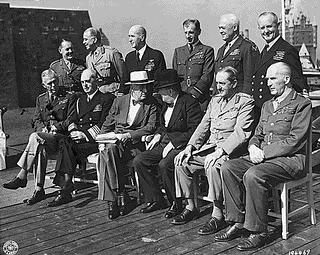 British and American combined Chiefs of Staff with President Franklin D. Roosevelt and Prime Minister Churchill. G.C. Marshall, Admiral W.D. Leahy, President Roosevelt, Prime Minister Churchill, Field Marshal Sir Alan Brooks, Field Marshal Sir John Dill; (standing) Maj. Gen. Hollis, Gen. Sir Hasting Ismay, Admiral E.J. King, Air Marshal Sir Charles Portal, H.H. Arnold, Admiral Sir A.B. Cunningham. Quebec Conference, September, 1944. (NA photo NRE-338-FTL(EF)-7217(4))
British and American combined Chiefs of Staff with President Franklin D. Roosevelt and Prime Minister Churchill. G.C. Marshall, Admiral W.D. Leahy, President Roosevelt, Prime Minister Churchill, Field Marshal Sir Alan Brooks, Field Marshal Sir John Dill; (standing) Maj. Gen. Hollis, Gen. Sir Hasting Ismay, Admiral E.J. King, Air Marshal Sir Charles Portal, H.H. Arnold, Admiral Sir A.B. Cunningham. Quebec Conference, September, 1944. (NA photo NRE-338-FTL(EF)-7217(4))
|